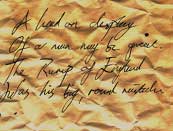The Rump of England
 This poem/rhyme was scribbled on a scrap of paper, found amongst the materials with Ludlow's map.
This poem/rhyme was scribbled on a scrap of paper, found amongst the materials with Ludlow's map.
"A head on display
Of a man maybe great.
The Rump of England
Was his big, round mistake"
Take a closer look at the original.
We now know that the ghost haunting this location is Oliver Cromwell, Lord Protector of the realm.
The Rump was a name given to Parliament at the time, and 'Roundheads' was the name given to the army he presided over during the English civil war (as opposed to the Cavaliers, who were the King's army).
Oliver Cromwell was born in Huntingdon in 1599, and was a strict Puritan who represented Huntingdon in Parliament. He possessed a Puritan fervour and a commanding voice, and quickly made a name for himself by serving in both the Short Parliament (April 1640) and the Long Parliament (August 1640 through April 1660).
King Charles I (nearly bankrupt) was trying to force a new prayer book on Scotland, but was beaten by the Scots, who demanded compensation. Charles had no choice but to summon Parliament. The Long Parliament refused to authorise any funding until Charles was tamed.
The Triennial Act of 1641 assured the summoning of Parliament at least every three years, a formidable challenge to royal prerogative. Parliament resented the insincerity with which Charles settled with both them and the Scots, and despised his links with Catholicism.
In 1642 Parliament placed the army and navy directly under parliamentary supervision and declared this bill become law even if the King refused his signature. Charles entered the House of Commons (the first king to do so), intent on arresting John Pym, the leader of Parliament and four others, but the five conspirators had already fled, making the king appear inept. Charles travelled north to recruit an army and raised his standard against the forces of Parliament (Roundheads) at Nottingham on August 22, 1642. England was in civil war.
Cromwell proved most capable as a military leader. By the Battle of Marston Moor in 1644, Cromwell's New Model Army had routed Cavalier forces and Cromwell earned the nickname "Ironsides" in the process. Fighting lasted until July 1645, the final Cavalier defeat at Naseby.
Within a year, Charles surrendered to the Scots, who turned him over to Parliament. By 1646, England was ruled solely by Parliament, although the King was not executed until 1649, when Cromwell was forced to order it - calling the beheading "cruel necessity".
In November 1648, the Long Parliament was reduced to a "Rump" Parliament by the forced removal of 110 members of Parliament by Cromwell's army, with another 160 members refusing to take their seats in opposition to the action. The Rump dismantled the machinery of government, abolishing not only the monarchy, but also the Privy Council, Courts of Exchequer and Admiralty and even the House of Lords.
The Rump devolved into petty squabbles, which lost it credibility in the eyes of the army. Cromwell ended the Rump Parliament on April 21, 1653. The army called for a new Parliament of Puritan saints, who proved as inept as the Rump. By 1655, Cromwell dissolved his new Parliament, choosing (rather ironically) to rule alone, much like Charles I had done in 1629.
Cromwell went from the title of Lord General of the Army to that of Lord Protector of the Realm (the title of King was suggested, but wisely rejected by Cromwell when the military objected). Cromwell died on September 3, 1658, naming his son Richard as successor. With Cromwell's death, the Commonwealth floundered and the monarchy was restored only two years later.
At the time of restoration, Cromwell's body was exhumed and decapitated, and his - now rather messy - head placed on display. It blew down in a gale, and was moved about a lot before being recovered quite recently - so they think, anyway.
